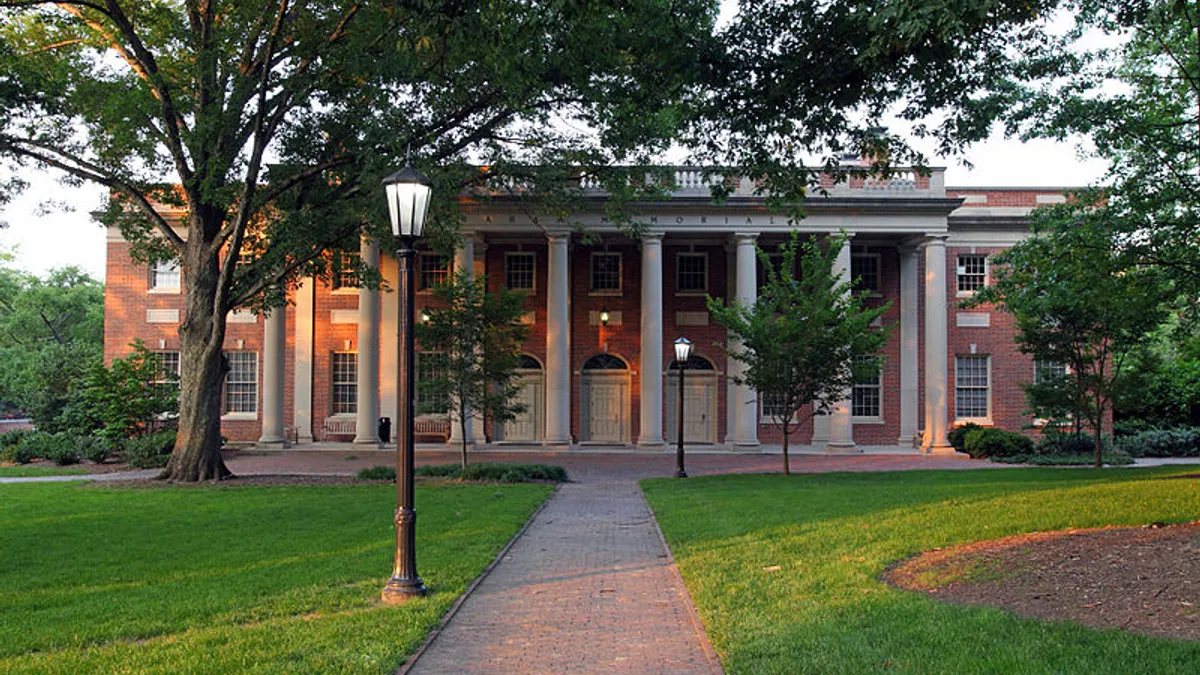The University of North Carolina (UNC) System picked Peter Hans, head of the state's community colleges, as its leader Friday, touting his state roots and ability to rise above rancorous partisanship.
Politicization is exactly what has plagued one of the most prestigious public education systems in the U.S., as two of Hans' most recent predecessors have parted ways with the board of governors on controversial terms. Observers have attributed recent scandals in the system and the presidential turnover to the one-sided political makeup of the governing board, as Republicans have dominated it for nearly a decade.
But in Hans, the system has found a chief executive well-liked on both sides of the aisle, Randy Ramsey, the board chair, said on a conference call with reporters Friday. He noted the top two leaders of the state Legislature, both Republicans, and North Carolina's Democratic Gov. Roy Cooper, celebrated Hans' selection in a joint statement.
"That we all agree on Peter is a testament to the respect he commands as an able, competent leader," the lawmakers said in their statement. "The UNC System is a shining example of quality, affordable public education. It bears responsibility for North Carolina's competitive and skilled workforce. We're confident Peter will continue to build on the System's centuries of success."
Hans will start as UNC president on Aug. 1. He will earn a base salary of $400,000, The News & Observer reported, with the possibility of incentive increases up to an additional $600,000 through June 2022.
He has led the North Carolina Community College System, one of the largest higher ed systems in the country, for two years, overseeing 58 campuses that enroll about 700,000 students. Hans also has been a long-serving member of UNC's governing board, chairing it from 2012 to 2014. As chair, he helped push through an agreement that streamlines credit transfers between the community colleges and UNC, an initiative Hans pledged to improve upon, he said during Friday's call.
"They are undervalued in terms of their impact and the reach and the scale of community colleges," Hans said.
Hans is the vice chair of myFutureNC, a nonprofit focused on boosting North Carolina's educational attainment. Hans earned his bachelor's degree in political science from UNC Chapel Hill and his master's in liberal arts from Harvard University. He's served as a policy adviser to two Republican federal lawmakers.
Hans will join the system not only in the thick of a global health crisis, in which colleges nationwide are taking severe financial blows and deciding whether it is safe to reopen campuses, but also as UNC heals from several high-profile, politically tinged controversies.
His appointment is "interesting" given UNC's history with hiring high-profile figures, often hailing from outside of the state, said Alvin Schexnider, a senior consultant and senior fellow at AGB Consulting, which offers guidance to governing boards. Past board scandals did not make UNC's presidential search easier. But generally, pressures on institution and system leaders nationwide have been building over the past several years, Schexnider said. And their tenure has diminished, according to 2017 research.
"The landscape has changed significantly. No matter how hard one tries, it's hard to get good people," Schexnider said.
UNC's previous president, Margaret Spellings, announced her departure in 2018, having grappled with several scandals. Her appointment was greeted with major pushback from students and faculty who disagreed with decisions she made as U.S. Secretary of Education in the George W. Bush administration. And her tenure overlapped demonstrations that roiled UNC Chapel Hill over Silent Sam, a monument celebrating the Confederacy that many perceived as a racist symbol. Protesters tore down Silent Sam in 2018, and it was eventually moved off the campus in a controversial arrangement.
Hans was also reportedly the favorite of some Republican legislators in 2015 to replace then-president Tom Ross, according to The News & Observer. Pundits felt Ross' exodus was politically motivated because of his liberal background.
Though the job ultimately went to Spellings, some UNC leaders believed she never had the board's full sport, making her time with the system turbulent. Hans helped Spellings on issues related to technology, healthcare, strategic planning and K-12 education from 2016 to 2018. In a statement through UNC, Spellings said Hans has worked "tirelessly to improve student achievement."
"When Margaret Spellings was starting, people opposed her and she didn't have that support," said David Green, chair of UNC's Faculty Assembly, the body representing the system's instructors. "In my view, she was fighting an uphill battle. Peter Hans is not going to have that."
Hans will need the board's support as he navigates the financial fallout from the pandemic and frustrations over racial injustice that are spilling over throughout the country, Green said.
Colleges nationwide are figuring out whether they can reopen campuses this fall and the safety precautions required to do so. A majority of colleges have said they intend to restart operations, with restrictions such as wearing face coverings and a variety of measures to maintain social distancing.
Hans will need to effectively communicate with state legislators the needs of all 17 UNC campuses, Green said. The public tends to default to Chapel Hill when considering the UNC System, but the issues across all of its campuses are far more diverse. The system could take lessons from the state's community colleges, Hans said during Friday's call, such as by improving access to education and learning to "stretch a dollar more effectively."
Green believes Hans recognizes the tensions around police forces, and for campus departments in particular, their relationships with students. UNC students have long had fraught ties with campus police over racial issues.
Though Green is stepping down as assembly chair at the end of this month, he will work with Hans on the governing board's new Equity Task Force designed to review racial problems on the campuses and make recommendations around them.
"I'm convinced he will make this a priority," Green said.

















